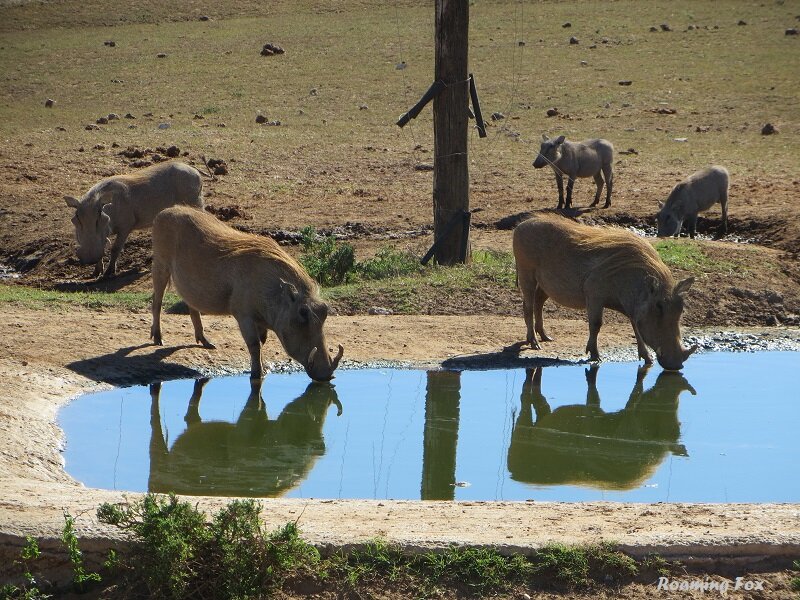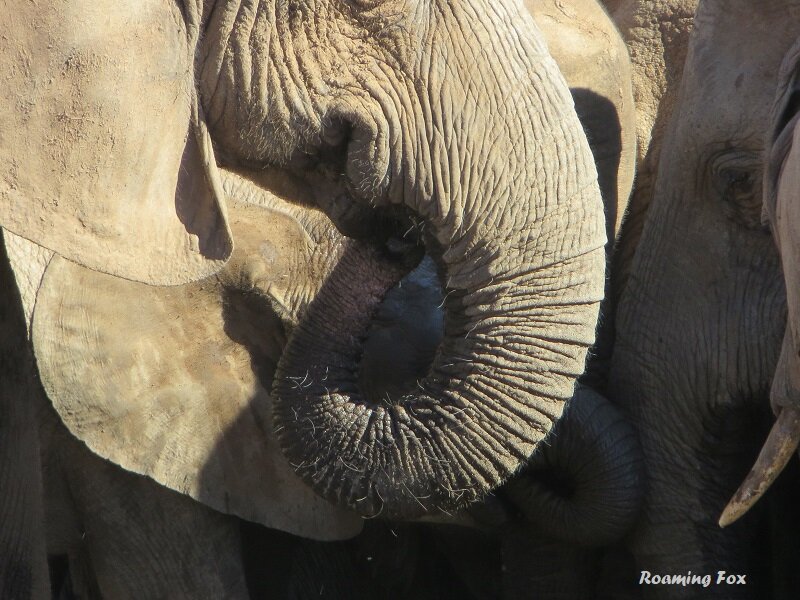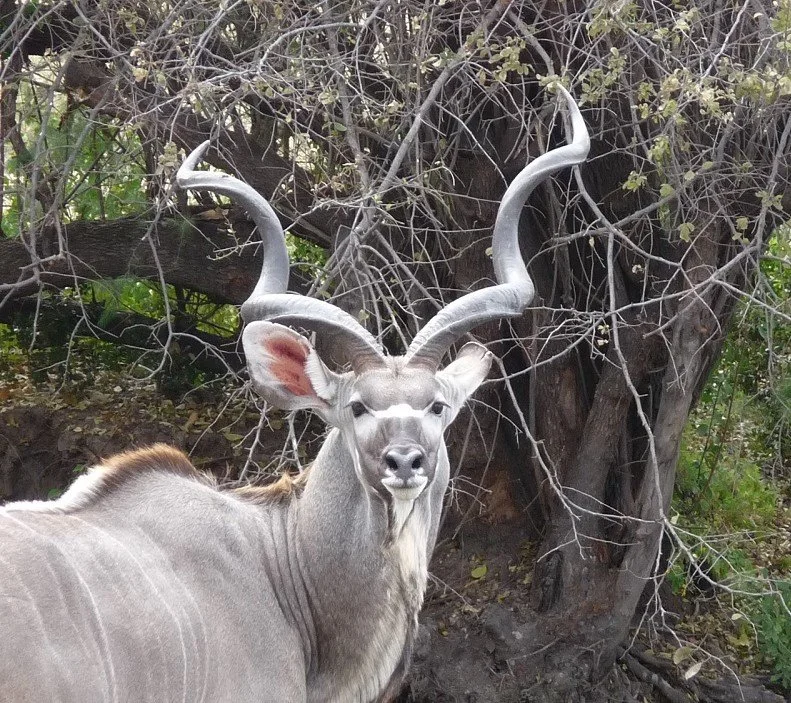Facts about Addo Elephant National Park
Eastern Cape – South Africa
A self-drive safari to Addo Elephant National Park
On our recent scenic road trip to the Eastern and Western Cape one of our safari stopovers was to be Addo Elephant National Park. I was hoping to have some special elephant encounters like we had in Hwange, Zimbabwe and Mapungubwe.
As we entered the park I asked the staff working at the office facetiously if we would see any elephants. She of course was non-committal, but with a playful smile and twinkle in her eyes.
First we stopped at the shop which was well stocked with curios and a few other items, to buy some snacks and cold drinks because after all, it is thirsty work searching for wild animals! There is a restaurant as well, but we did not make use of it. After driving around the park we would return to the interpretive centre which is also at the main rest camp.
We chose to self-drive at a leisurely pace, not sure if we would see much because the endemic vegetation of Spekboom (Portulacaria Africa), a predominate shrub growing in the Addo, was dense. Elephant and kudu love it though and within a few minutes we saw both species.
Water holes and open areas ensured that we could see other wildlife quite easily.
Look at those cute little horns on the baby buffalo!
4 Amazing facts about Addo Elephant National Park
What is different about the elephants at Addo? Most of the female elephant don’t have tusks although bull elephants from the Kruger National Park were introduced to widen the gene pool so you will occasionally see Addo elephants with tusks.
What is special about Addo Elephant National Park? It is a unique park because it can boast that it has Africa’s Big 7. Not only are there elephants but rhino, lion, buffalo and leopard too. Furthermore an offshore marine reserve has been added to it, making it the third largest national park in South Africa. That means it has the southern right whale and the great white shark to add to the Big 5. It also includes two islands - St Croix Island and Bird Island - that have breeding colonies of penguins and gannets so you can add those to your safari bucket list too.
What is so special about Spekboom, a prolific shrub at Addo? Elephants are destructive but thankfully the plentiful Spekboom regenerates easily and therefore is replenished quickly and naturally. Apparently this succulent has the ability to absorb carbon like a sponge. No wonder there is so much fresh clean air at Addo!
Addo is one of the few places you find the flightless dung beetle, a subspecies named Circellium bacchu. They are rather special because they are one of the rarest species of the dung beetle and there is copious amounts of dung for them in Addo. Most of the other species in Africa have to fly to find excrement.
Location for Addo Elephant National Park
Addo is situated in the dense bush of the Eastern Cape, South Africa in a malaria free area. The most direct route is approximately 68 km from Gqeberha (Port Elizabeth) to Addo. We chose to travel via Paterson which is about 100 km and takes just over an hour. This route was recommended by people who live in Addo and know the area well, including its safety issues.
Useful information about Addo
Addo is one of South Africa’s national parks and is the third largest park after Kruger National Park and Kgalagadi Transfrontier Park.
There is an entrance and conservation fee payable at reception. Alternatively you can use your up to date Wild Card if you are a South African resident.
There is an International All Parks Cluster which gives foreigners access to approximately 80 parks and reserves around Southern Africa, which are included in the SANParks, Msinsi, EKZNWildlife, Cape Nature and Swazi Clusters Parks.
The park is open for day visitors and no booking is required. However if you need accommodation it is recommended to book in advance.
How many days you would need for Addo would depend on the activities you want to do. Even though Addo Elephant Park is the third largest national park in south Africa, if you only want to do a self-drive safari, one day can be adequate. If however you would like to see the park in more depth and detail, you would need a few days.
Bokmakierie
Can you stay over? There is accommodation at Addo and ranges from campsites and a wide variety of other accommodation in the main rest camp. There are also luxury lodges, bush camps, tented rest camps, huts and cottages in other parts of the park.
Unfortunately during our camping road trip there weren’t any campsites available for us so we opted to stay outside the park at a delightful little place, Homestead B&B at the little town of Addo.
Activities at Addo Elephant National Park:
Game Drives (self-drive, guided and hop-on guides)
Horse Trails
4x4 Trails
Hiking Trails
Marine Eco Tours
PSST! Here’s a hot tip:
Alexandria Dune Field stretches over 15 800 hectares. Park your car at Woody Cape Backpackers. Apparently you will be able to take a gentle stroll on a boardwalk for ten minutes and see this magnificent dune. Wish I had known this before.
If you are more energetic you can walk the dunes over a two-day period. You may be lucky to see middens of the Strandloper (historic nomadic beach walkers). They contain shells and bones of the animals eaten during that period of history. Often there are fragments of pottery or stone implements found too.
Interpretive Centre at Addo Elephant National Park
If you visit the Interpretive Centre you will find a mounting of the head of Hapoor – a legendary dominant bull that stayed in the park for 24 years. Hap means bite and oor means ear. A noticeable piece of his ear is missing presumably caused by a hunter’s bullet. This apparently caused his hatred for humans and park staff often fled to safety when Hapoor advanced towards them.
Facts about elephants:
Adult elephants drink 100 - 200 litres a day.
Their trunks hold between 5 and 15 litres.
They eat 100 - 200 kg per day.
Their intestines are approximately 18 metres long.
Their hearts weigh up to 27 kg.
The average weight of a male elephant is 5000 – 6000 kg.
The gestation period is 22 months.
They can reach a height of up to 4 metres.
DID YOU KNOW:
I often mention that the elephant’s closest relative is the rock hyrax. In this photo you will see their skeletal system is very similar.
Skeleton of an elephant with the skeleton of a rock hyrax for comparison
Skeleton of a rock hyrax
Suffice to say we saw numerous elephants and kudu with beautiful long horns were abundant. So were warthog. We were even lucky to see a black rhino and a pair of fish eagles. Addo Elephant National Park is worthy of a visit. Do make time to see it and if you are interested in marine life add that to your itinerary.
Pin on Pinterest
Pin for later
Click on Pinterest button to pin
Addo Elephants
Let’s meet on Social Media:
Booking Accommodation
If this article inspires you to travel it would be greatly appreciated if you book your accommodation via the links on this page. Alternatively take a look at my shop page. When you book it will earn us a small commission at no extra cost to you. This will also assist in keeping the Roaming Fox website running.
As always, I appreciate your support. Thanks! – Alma aka Roaming Fox.































We were entering one of the first national parks declared in Zimbabwe that was situated at altitudes of between 1800 and 2593 metres, the highest terrain of Zimbabwe. We’d heard that the Eastern Highlands are one of Zimbabwe’s most picturesque areas.